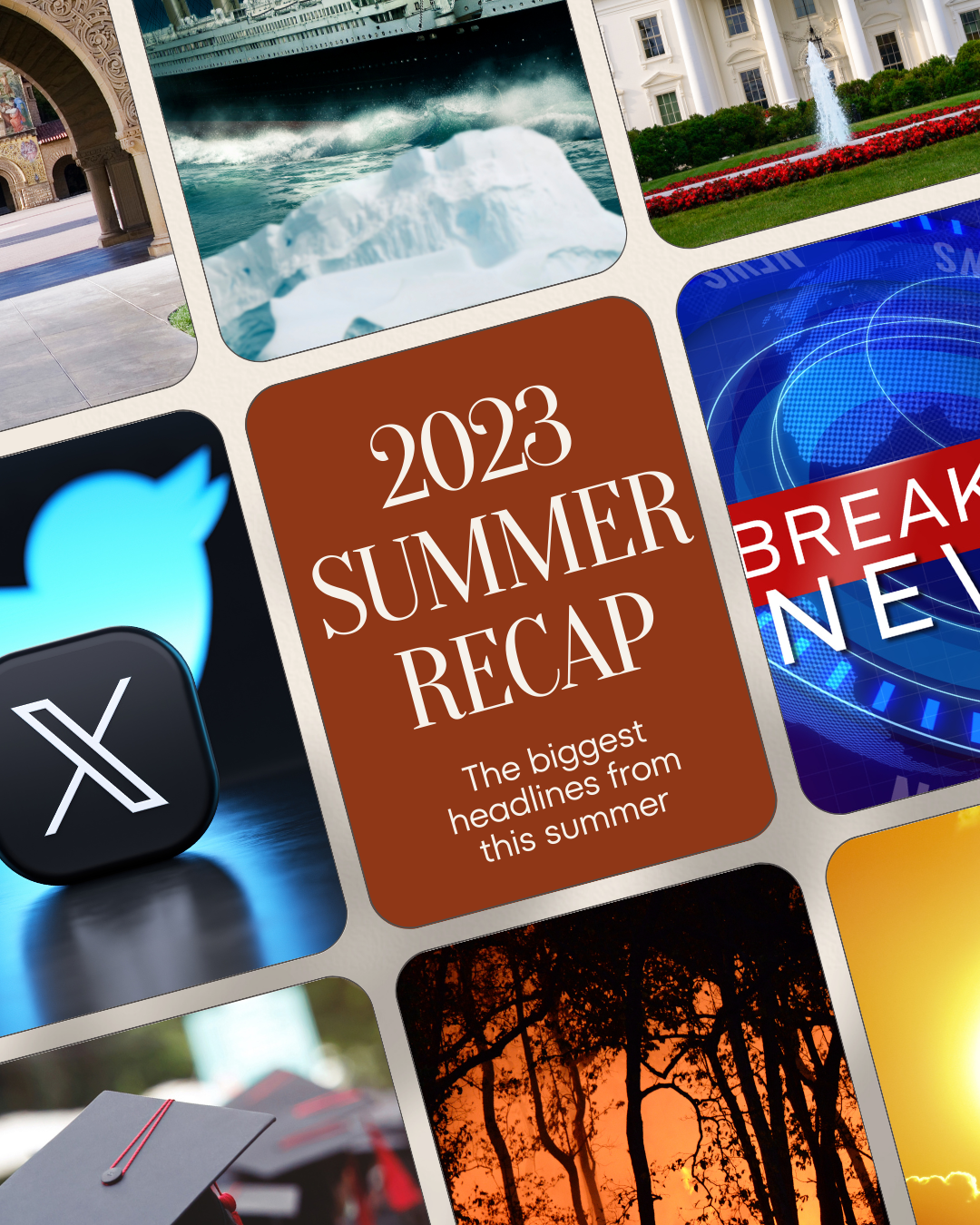While students spent their summer break traveling and relaxing with their friends, many important events swept the news, from the affirmative action ruling to wildfires. Here is a rundown of the most notable headlines from this summer.
June 3 – Biden signs debt ceiling deal into law
On June 3, Biden signed a bill that would suspend the debt limit until 2025. The bipartisan bill was passed through Congress in an exceptionally short amount of time, in order to meet the deadline of June 5 that the Treasury Department had set.
Since 1917, the debt limit or “debt ceiling” has set the maximum amount of federal debt that the United States government can be in through its bonds. In January, the U.S. began nearing this debt ceiling–an ominous sign. If the debt ceiling were reached and the nation could not pay its bills (often referred to as “defaulting on debt”), the effects would spread across economies worldwide, and a recession could soon follow.
June 18 – Titan submersible implodes
The Titan submersible was a tourist expedition that carried 5 people down over 13,000 feet to view the wreckage of the famous Titanic, which sank in 1912. The voyage set out on June 18, only to lose contact with a surface ship about 1 hour and 45 minutes into the trip. Later that week, the U.S. Navy said they had detected an implosion, and Coast Guard Rear Admiral John Mauger confirmed that debris from the Titan was found in the area.
OceanGate Expeditions, the company behind the Titan, was founded in 2009 to create submersibles for research and commercial purposes. In 2018, concerned industry leaders signed a letter to the company, warning that their “experimental approach” might result in “catastrophic” consequences. The June 18 expedition had several wealthy and famous guests on board, including the CEO of OceanGate, Stockton Rush. The guests had paid fees of up to $250,000. All 5 people on board were confirmed by OceanGate to have passed away.
June 29 – Students for Fair Admissions v. the University of North Carolina and Students for Fair Admissions v. President & Fellows of Harvard College
On June 29, the U.S. Supreme Court banned affirmative action from universities around the nation. Affirmative action allows schools to consider race as a factor when admitting new students. Research has shown that stopping affirmative action leads to a drop in admissions rates for many minorities, especially for African-American students. However, some consider affirmative action “unfair” because it is thought to discriminate against other qualified applicants.
This issue has pitted Asian Americans in particular against other people of color. The “model minority” myth extends into the affirmative action issue, suggesting that like white students, Asian Americans are losing spots to other minority groups. This is not supported by research.
July 19 – Stanford Research Scandal
On July 19, Stanford announced that President Marc Tessier-Lavigne would be resigning from the position effective at the end of August, and retract or issue corrections for 5 invalidated research papers. While there was no evidence that Tessier-Lavigne himself manipulated the data in the reviewed papers, he had not corrected mistakes on several occasions when concerns were raised (Stanford’s report highlighted such instances in 2001, the 2010s, 2015-2016 and 2021). It is considered very unusual for multiple papers by the same author to be retracted.
July 23 – Twitter rebranded to X
In October 2022, SpaceX founder and CEO Elon Musk bought Twitter for $44 billion. In July 2023, he announced his plans to rebrand the platform, which has been known as Twitter since 2006, as X. This move drew the internet’s attention and in many cases, criticism. Musk’s brand pivot resembles similar moves from other corporations in recent years (Zuckerberg’s switch from Facebook to Meta comes to mind). This announcement also came shortly after the launch of Meta’s new social platform Threads, which made many headlines as the “Twitter Killer.”
July 25 – Canadian wildfires spread into U.S. cities
In July 2023, smoke from over 1,000 Canadian wildfires drifted into northern U.S. cities like Chicago and Minneapolis. On July 25, Chicago, Minneapolis, and Detroit were some of the most polluted cities in the world (according to pollution tracker IQAir). The National Weather service sent air quality alerts to millions of people in these areas. The city of Chicago even recommended that civilians wear masks, run air purifiers, and limit outdoor exposure. As of August 30, the fires continue to rage in Canada, but the air quality has improved in many northern U.S. Cities. In total, more than 37 million acres were burned due to the Canadian wildfires.
August 1 – Austin’s hottest July on record
As of August 2023, July of this year was Austin’s hottest July on record. The average temperature over the month was 90.8°, and no other July in recorded history had an average temperature higher than 90°. Weather records in Austin date back to the 1890s.
This record-breaking heat has had various impacts on the community. Restaurants have experienced less foot traffic, and the heat poses many health risks to the body (fatigue, heat exhaustion, and heat stroke). Drinking extra water and staying inside can help counteract these effects.
August 8 – Maui’s deadly fires
On August 8, fires swept over Maui, Hawaii. The tourist hub on the island, Lahaina, was quickly destroyed, and at least 115 of lives were lost (though a lack of radio and cell signals also made it difficult to estimate how many people were unaccounted for). Thousands were left without power, fleeing for shelter.
A combination of factors led to the Maui inferno in August. The region had already been dealing with a severe drought, and Hurricane Dora created a large difference in air pressure that strengthened winds.


